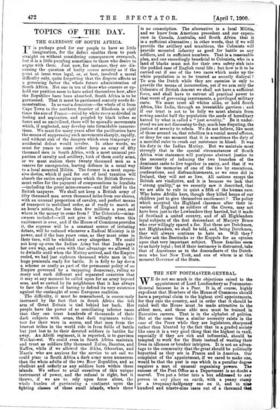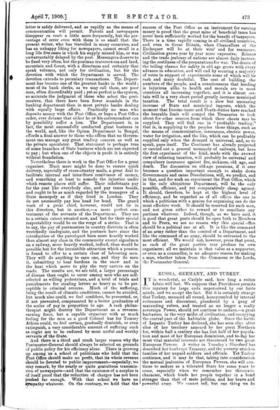THE NEW POSTMASTER-GENERAL.
WE do not see much in the objections raised to the appointment of Lord Londonderry as Postmaster- General because he is a Peer. It is, of course, highly expedient that Members of the House of Commons should have a perpetual claim to the highest civil appointments, for they rule the country, and in order that it should be ruled well the House must be made attractive to the ablest men, and those able men must be trained, in Executive careers. That is in the alphabet of politics. But at the same time a similar necessity exists in the case of the Peers while they are legislators, sharpened rather than blunted by the fact that in a graded society like ours it is a very good thing that the highest in rank, especially if they are rich and influential, should be tempted to work for the State instead of wasting their lives in idleness or boudoir intrigues. It is not an advan- tage to the community that the great should be politically boycotted as they are in France and in America. Our complaint of the appointment, if we cared to make one, would be that the post is one which in a peculiar degree requires a man of unusual organising powers. The success of the Post Office as a Department is no doubt a marvel. You put a letter into a box addressed to any person in any place on earth, with a penny stamp or a twopenny-halfpenny one on it, and in nibs hundred and ninety-nine cases out of a thousand that letter is safely delivered, and as rapidly as the means of communication will permit. Parcels and newspapers disappear en route a little more frequently, but the per- centage of error even with them is so small that the present writer, who has travelled in many countries, and has an unhappy liking for newspapers, cannot recall in a long life five eases in which his supply missed him, or was unwarrantably delayed by the post. Messengers deserve to be fined very often, but the postman traverses sea and land, mountain and forest, with a directness and certainty that speak volumes, not only for civilisation, but for the devotion with which the Department is served. The devotion extends to pecuniary transactions. The Depart- ment has become one of the greatest banks in the world ; most of its bank clerks, as we may call them, are poor . men, often discreditably paid ; yet so perfect is the system, so accurate the judgment of those who select the post- masters, that there have been fewer scandals in the banking department than in most private banks dealing with equally large affairs. Practically no man who deposits money with the Post OffiCe, or buys a Post Office order, ever dreams that either he or his correspondent can by possibility suffer a loss. The Department is, in fact, the most successfully conducted great business in the world, and, like the Opium Department in Bengal, affords a final answer to those who affirm that no Govern- ment can manage any great trading concern as well as the private speculator. That statement is perhaps true of some branches of State business which are not expected to pay; but when one of the objects is profit it is entirely without foundation.
Nevertheless there is work in the Post Office for a great organiser. Much more might be done to ensure quick delivery, especially of cross-country mails, a great deal to facilitate internal and inter-State remittance of money, and something at least to remedy the injustice under which remote places still suffer. Their inhabitants pay for the post like everybody else, and pay taxes beside, and ought to be as much regarded by the managers of a State monopoly as if they lived in London. They do not necessarily pay less-head for head. The grand work of a great chief, however, would not lie in this direction, but in another,—a more perfect con- tentment of the servants of the Department. They are to a certain extent sweated now, and but for their special respectability would be on the verge of a strike. That is to say, the pay of postmasters in country districts is often wretchedly inadequate, and the postmen have since the introduction of the parcel-post been more heavily worked than almost any class in the community except signalmen on a railway, more heavily worked, indeed, than would be possible but for the irresistible attraction which a pension is found to offer to a certain class of labouring men. They will do anything to earn one, and they do earn it, submitting to bear burdens in the snow and in the heat which move to pity the very carters on the roads. The results are, we are told, a larger percentage of disease than ought to occur among men who are self- selected as willing pedestrians, and a total of trials and punishments for stealing letters so heavy as to be per- ceptible in criminal returns. Much of the suffering, being the result of climatic conditions, cannot be avoided, but much also could, we feel confident, be prevented, or, if not prevented, compensated by a better graduation of the scales of pay in• proportion to age. A rash philan- thropist might destroy the Department as a; revenue- earning force, but a capable organiser with as much feeling for the men as a good Colonel has for Tommy Atkins could, we feel certain, gradually diminish, or even extinguish, a very considerable amount of suffering such as ought not to be endured by most useful and worthy servants of the State.
And there is a, third and much larger reason why the Postmaster-General should always be selected on grounds of public policy for his efficiency alone. There is growing up among us a school of politicians who hold that the Post Office should make no profit, that its whole revenue should be devoted to public improvement—especially, we rimy remark, by the nearly or quite gratuitous transmis- sion of newspapers—and that the existence of a surplus is of itself proof that the reduction of charges has not been plashed far enough. With that school we have no syMpathy whatever. On the contrary, we hold that the success of the Post Office as an instrument for earning money is proof that the great mine of beneficial taxes has never been sufficiently worked for the benefit of taxpayers. There is a time rapidly coming in all civilised countries, and even in Great Britain, when Chancellors of the Exchequer will be at their wits' end for resources. Civilisation grows year by year more expensive. Science and the trade jealousy of nations are almost daily increas- ing the costliness of the preparations for war. The desire of the toiling. classes for safety in old age grows with every advance in education, and will end by securing a majority of votes in support of experiments some of which will be rash and many doubtful. The cost of building, the numbers of the people, and a consciousness that herding is injurious alike to health and morals are in most countries all increasing together, and it is almost cer- tain will in a very short period greatly increase municipal taxation. The total result is a slow but unceasing increase of State and municipal imposts, which the moment that Income-taxes and Death-duties have reached the bearable limit will compel the Treasuries to look about for other sources from which their chests may be supplied. They will find one in "profitable' trading," that is, in supplying to the peoples those things, such as the means of communication, insurances, electric power, water for irrigation, and the like, which can be profitably supplied only when the demand is universal, and, so to speak, pays itself. The Continent has already projected or carried out a general monopoly of railways, but here the first experiment of the kind, made with the avowed view of relieving taxation, will probably be universal and compulsory insurance against fire, sickness, old age, and death. The discussion on old-age pensions, if it ever becomes a question important enough to shake down Governments and cause Dissolutions, will, we predict, end in that, and for such an experiment the Post Office, which is the only ubiquitous Department, will be the only possible, efficient, and yet comparatively cheap agency. It should, therefore, be kept at the highest level of efficiency, and be regarded as of all offices the one in which a politician with a genius for organising can do the most effective work. It should be reserved for such men, and not given either to reward or to conciliate any partisan whatever. Indeed, though, as we have said, it is good that great posts should be open both to Members and to Peers, we see no reason why this special office should be a political one at all. It is like the command of an army rather than the control of a Department, and - like the command of an army, should be entrusted to the most efficient. We would not, however, press that point, as each of the great parties may produce its own organisers; all we maintain is that value as a supporter, or even as a counsellor, is no adequate reason for making a man, whether taken from the Commons or the Lords, the Postmaster-General.







































 Previous page
Previous page